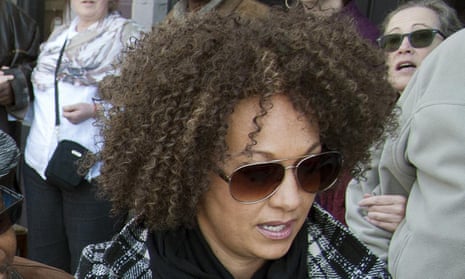The way in which people compare how Rachel Dolezal identified as black and then was revealed to be of European descent to how transgender women are “really” men pretending to be women reveals the enormous bigotry that many cisgender people have against trans people, more than anything else about race or gender. Some people are willing to make any negative comparison – no matter how far-fetched – to discredit and shame us trans women.
The fundamental difference between Dolezal’s actions and trans people’s is that her decision to identify as black was an active choice, whereas transgender people’s decision to transition is almost always involuntary. Transitioning is the product of a fundamental aspect of our humanity – gender – being foisted upon us over and over again from the time of our birth in a manner inconsistent with our own experience of our genders. Doctors don’t announce our race or color when we are born; they announce our gender. People who are alienated from their presumed gender and define themselves according to another gender have existed since earliest recorded history; race is a medieval European invention. Thus, Dolezal identified as black, but I am a woman, and other trans people are the gender they feel themselves to be.
Dolezal might feel an enormous affinity to blackness – so much that she decided to identify as black – but her decision to occupy that identity is one that was forged through her exposure to black culture, not a fundamental attribute of her existence. Someone’s racial identification isn’t automatically less important than their gender in an American context, given our tumultuous history and the ways in which society’s perceptions of both either privilege or restrict one’s economic and social opportunities and mobility. But someone who crosses racial boundaries from a privileged one to a marginalized one is much more likely to do so for political purposes (as Dolezal seems to have done) or to profit from minority culture (as we’ve seen time and time again with white artists, like Iggy Azalea, appropriating black culture). Transitioning doesn’t often benefit trans people politically or financially; it benefits us because it is a way to begin to make our external presentation match our internal perceptions of ourselves, even as it is likely to disprivilege us socially and economically.
As person of color who is, by and large, perceived by strangers as white, I’m keenly aware of the differences between how I “pass” as a white person and how I “am” a woman. Race is a social construction originally designed to separate and justify the subjugation of darker peoples for the purposes of European supremacy, so when strangers – even fellow Filipinos – refuse to believe me when I tell them that I’m Asian, that I have partial albinism and I’m an immigrant to the United States, I realize that they’re inviting me to pass, and to take advantage of the privileges of a racial construct that would normally subjugate people like me. But while society imposes a ton of social conditions on people because of their gender, those conditions are common across many societies and thousands of years. I was not perceived as a “white person” until I came to the US because Philippine indigenous culture had no reason to separate people by skin color for the purposes of justifying the use of darker peoples as free labor. (If this concept is confusing, I suggest reading Franz Fanon.)
The people comparing Dolezal to trans people are depicting our actions as rooted in the same deceptions as hers: her apparent use of skin-darkening agents and products to change the texture of her hair are, implicitly or explicitly, likened to what “men” – to use a trans woman’s example – doing what we do to “deceive” people into thinking we are women. But Dolezal engaged in such actions in order to be perceived as black, in a racialized American environment where that matters. Trans people transition in order to be the gender we feel inside and, while there may come a time when posers will appropriate trendy trans culture for profit, right now, there’s no advantage to transitioning when you’re not trans. Trans people don’t even have the legal protections – like laws that protect access to housing, public accommodation and employment opportunities – that black people and other racial minorities have fought so hard to win.
Though I can’t live in Dolezal’s shoes and can’t understand her motivations, to me, her long history of fighting for black civil rights makes me at least a little empathetic to the decision, however ill-advised, however she arrived at it, that she made to identify as black: at least she didn’t just co-opt black culture for profit without having any real concern for black people. The people using her mistakes to try to “understand” or “explain” the experiences of trans people have none of my empathy; they’re simply propagating the stereotype that trans people are out to fool the rest of you. I don’t need to pass as a woman the way Dolezal needs to pass as black, for the simple reason that I am a woman.
